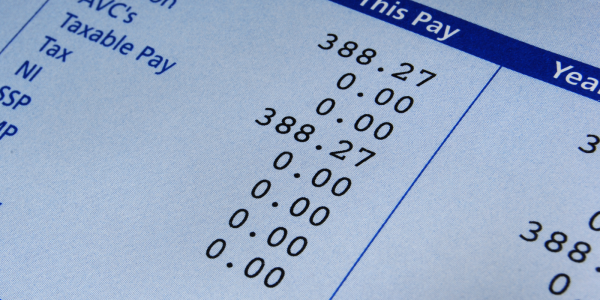Why payslips are so important
You can use your payslips to check that your pay is correct. But there are also many other reasons to look after your payslips. By ‘look after’, we mean make sure you are receiving them and can access them, that you check them carefully and that you keep them somewhere safe!

Payslip basics
You should receive a payslip each time you are paid. If your employer does not give you a payslip each payday, you should ask for one. You can bring a claim in the Employment Tribunal if your employer doesn’t provide you with a payslip.
Your payslip may come in different formats, such as on paper or electronically. Many employers send password-protected payslips by email for security reasons. Some employers place payslips in an online secure storage facility that you can access with personal login details. We know it is easy to forget login details and passwords, but it is important that you can access your payslips. If you leave a job, make sure you download copies of all your electronic payslips before you leave, as you may no longer be able to access them online after you have left.
Your payslip contains essential information such as your gross pay (your pay before tax is taken off) and how much tax you’ve paid. It is vital you check the details on your payslip regularly, including tax codes and any deductions, to ensure everything is correct and up-to-date.
Keep all your payslips in a safe place for as long as possible – you may need them for all sort of reasons, some of which may not be immediate or apparent – as we explain below.
Main reasons to look after your payslips
You can check you are being paid correctly – you may need to check hours worked and the rate of pay. If you are on the minimum wage and think you have been underpaid, HMRC may ask to see your payslips, so they can investigate your employer.
You might need them to complete a tax return or to apply for a tax refund – for example, to complete a form P87 to get tax relief on your employment expenses, it is now mandatory to provide your employer PAYE reference number, which can often be found on your payslips.
You will better understand the break-down of your net pay (the amount you get after all deductions have been taken off). Unfortunately, some employers manipulate people’s pay and taxes to benefit themselves, as we explain here. Checking your payslips regularly, rather than just relying on the amount of net pay you receive looking about right, will help you spot if there are any problems with the way your employer is dealing with your pay and taxes.
Your payslips provide proof of your earnings – which is something that you must have when applying for a mortgage or looking to rent a property. You may also have to show them when applying for a loan or other financial products.
They might come in useful if you are planning to change jobs – some employers may ask you to provide a few recent payslips as proof of current income when you are negotiating your new salary.
They are ‘evidence’ if PAYE goes wrong – it is not unusual for the PAYE system to result in you paying the wrong amount of tax. But occasionally you may pay the wrong tax under PAYE because HMRC or your employer have made a mistake. Your payslips may be a key part of the evidence as to what has happened and who, if anyone, is at fault. You may need professional help to sort it out. In almost all instances, the better information an adviser receives (by way of payslips), the quicker and easier they will be able to assist.
They provide proof of deductions – very occasionally the deductions (including tax and National Insurance) your employer makes from your wages can go missing – either because HMRC ‘lose’ them in their systems (for example they allocate them incorrectly) or because employers fail to pay them over. In these instances, HMRC may well credit you with the relevant amounts but only if you show evidence that the deductions were made. This is particularly important for National Insurance, so that you don’t have gaps in your record. What’s the best form of evidence? You guessed it – payslips!
They can help you prove your identity – for example if you want to access government online services via the Government Gateway. You can use information from payslips dated within the last 3 months to help prove your identity. If you can’t pass the identity checks then you will not be able to access online services, which could be an inconvenience to you.
They can prove loss of earnings – if you’re involved in an accident or become ill and seek compensation or to draw down on some kind of protection policy, you may be asked for your payslips as proof of what you will lose in earnings.
One last thing…
While employers are obliged by HMRC to keep payroll information (which payslips are part of) for three years from the end of the tax year they relate to, there is no guarantee that your employer will be around to help you with payslip-related requests or will be willing or able to provide you with duplicates.
All in all –it’s really in your best interests to keep hold of your payslips – and for as long as possible. Note that people who are required to submit a tax return have a legal obligation to keep them for a certain period.
For more information on payslips, including an example payslip, see the Understanding your payslip page in our resources section.
